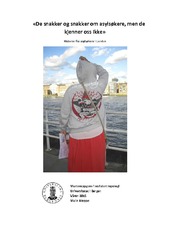"De snakker og snakker om asylsøkere, men de kjenner oss ikke". Historier fra asylsøkere i London
Abstract
Denne oppgaven tar utgangspunkt i historier som er fortalt meg fra mennesker som er i, eller har gjennomgått en asylprosess i London. Mine informanter synes å være begrenset hvordan i hvordan de kan komme til uttrykk. Jeg lurer på hvor de begrensningene kommer fra. Gjennom oppgaven argumenterer jeg for at hvordan asylsøkere kan uttrykke seg påvirkes av strukturelle og erfaringsbaserte forhold. Det synes å være en forestilling av hvordan en flyktning er', som får konsekvenser for hvordan mine informanter kan presentere seg selv i asylprosessen, og i dagliglivet utenfor. Dypest sett synes det at forestillingen mine informanter blir møtt med, får konsekvenser for hvem de kan være. Jeg presiserer at verken jeg eller andre som alltid har levd i trygge omgivelser fullt ut forstå hva mennesker på flukt har levd gjennom. For asylsøkere er virkeligheten mer brutal. Radikale forskjeller i erfaring av livet, betyr ikke at jeg og andre utenforstående ikke kan relatere oss til mennesker som søker asyl. Jeg argumenterer for en økt sosial anerkjennelse av asylsøkere, som mennesker med en verdi inn i våre fellesskap. This thesis revolves around stories, told to me by people who are going through, or have been through, an asylum process in London. It seems to be some barriers in how my informants can express themselves. I wonder where these barriers come from. Through this thesis, I argue that how asylum seekers are able to express themselves is affected by structural and experience-based factors. There seems to be an expectation of what a refugee is', which influences how my informants present themselves in the asylum process, and their daily lives. In a profound sense, this expectation, gives consequences to who they can be. I stress that neither I, nor others, who have always lived in safe surroundings, can fully understand what refugees and asylum seekers have lived through. For asylum seekers there is a more brutal reality. Radical differences in how we have experienced life, does not mean that I, nor others, cannot relate to people that seek asylum. I argue for a higher social recognition of asylum seekers, as human beings with worth and value to our societies.
